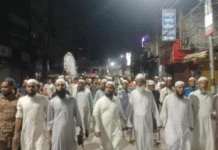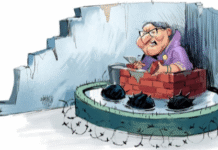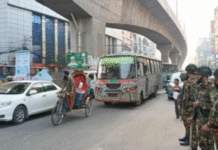‘BNP needs soul-searching’
 Despite considering every life valuable, National University vice chancellor Harun-or-Rashid views that pre-polls violence is a “normal part” of Bangladesh’s electoral culture.
Despite considering every life valuable, National University vice chancellor Harun-or-Rashid views that pre-polls violence is a “normal part” of Bangladesh’s electoral culture.
He thinks the prevailing political situation suggests there is “level-playing field” for all the contesting parties as the country is going into voting for the 11th parliament on 30 December.
In an interview with Prothom Alo, he observed that all the talks of “level-playing field” had come to the fore only after the fifth parliamentary elections held in 1991.
“We didn’t discuss about level-playing field in the election of 1970. Bangabandhu never talked about level-playing field. This wasn’t discussed even during the times of army rule. We’ve been discussing it since the elections in 1991,” he said.
The political science professor blamed the principal opposition Bangladesh Nationalist Party for making the “level-playing field” tilted to their past activities, making the red card holders [Bangladesh Jamaat-e-Islami] its ally, unleashing violence in 2014 and 2015 and consequently, what he claimed as the party’s alienation from the people.
He asked if the police and administration’s resistance coukld be blamed for the BNP’s failure to mobilise the people for demonstration against the AL government in the past 10 years.
“How can you say this? How did the Awami League observe 6-point day on 7 June 1966? The administration cannot resist you if you have support of the people or the party can overcome it if there’s any resistance,” he observed.
About the reason of no visibility of any poster or campaign of the opposition candidates across the country, he said he “heard that the BNP is doing this as a part of their strategy”.
Professor Harun, who was appointed by the incumbent government as the VC of National University for the second term in February 2017, brushed aside allegations against the ruling Bangladesh Awami League about ruining the polls atmosphere.
On a separate note, he insisted that there is no necessity of balancing power between the president and the prime minister unlike the way the BNP has pledged in its election manifesto.
Professor Harun said only the people, not the government or any party, will decide on whether the BNP will form government or the number of seats it will win in the upcoming elections.
Professor Harun is against writing off the probability of emergence of former dictator HM Ershad-led Jatiya Part (JaPa) as the official opposition party in parliament through the 30 December elections.
“Say, for example, if the Jatiya Party gets more seats than the BNP, they will be the leader of the opposition … But I would say chances for the BNP is higher,” he said.
On how to minimise the difference betwen the country’s two major parties, Harun said BNP’s accepting of Bangabandhu as the architect of independence of the country could help.
He also called on the BNP leadership to be self-critical and repentant for their past deeds.
“You’d given shelter to the murderers of Bangabandhu, passed the indemnity bill, carried out the grenade attack on 21 August [2004]. [Tell me] how can there be any consensus? What the [BNP leaderships] needs is be self-critical and realise and be repentant for their past deeds.”
The National University VC said now is the time for the BNP “to take new pledge not to take unconstitutional measures by any means, not to follow the path of violence and sabotage, and to say what is rightful even if only five of their party leaders are elected as MPs in parliament”.
He feels this is the last chance for the party to save itself.
Harun also expressed his views that the new opposition coalition of Jatiya Oikya Front will disappear after the elections.
“You’d see Bangladesh entering a new era, a positive one, after this election. The BNP has nothing to lose, but the world to gain … Instead of judging by the number [of seats they’re getting in parliament], they must limit themselves in constructive politics,” professor Harun said.
* This piece, originally published in Prothom Alo print edition as interview text, has been rewritten in English news story format by Shameem Reza









